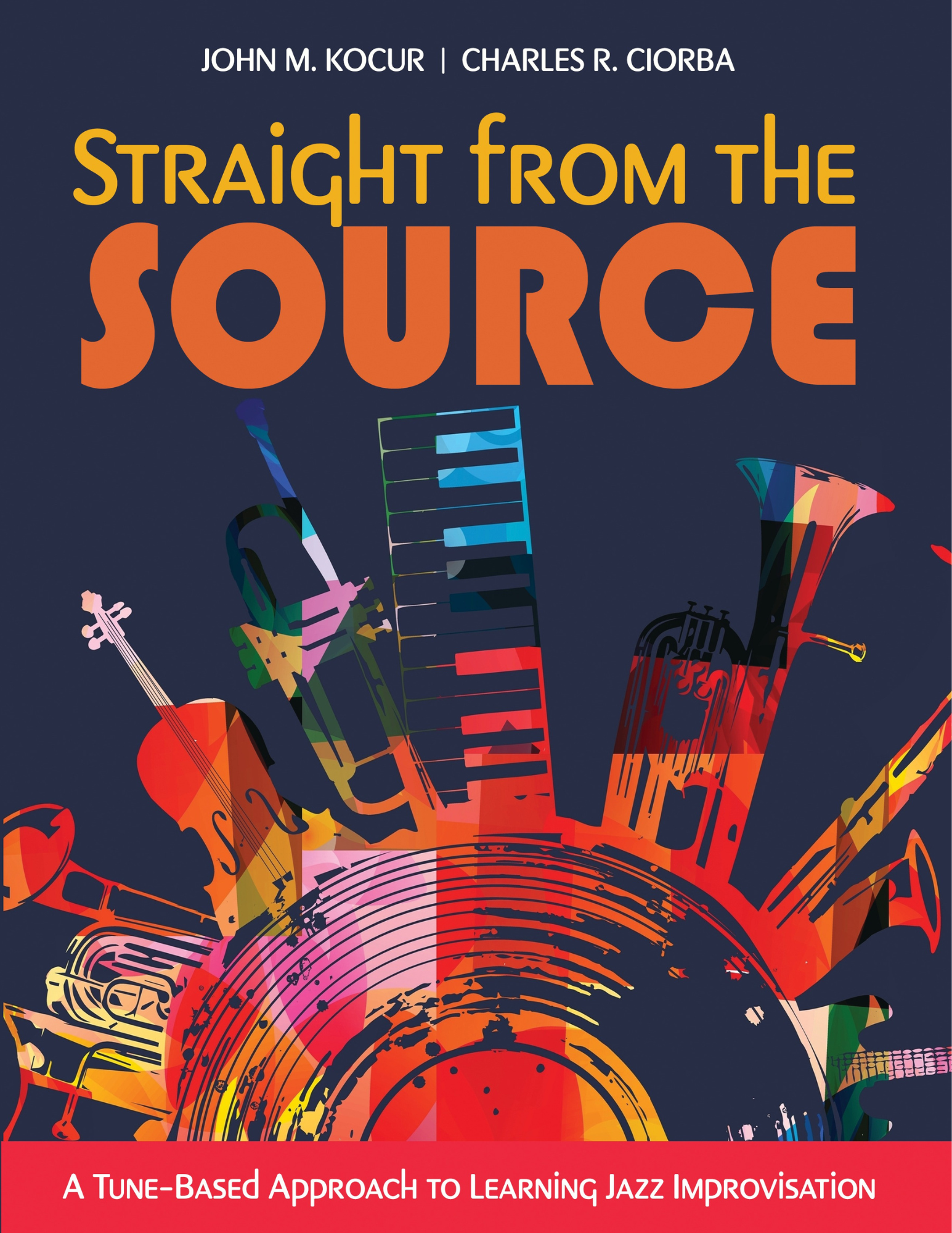Straight from the Source: A Tune-Based Approach to Learning Jazz Improvisation
Author(s): John Kocur , Charles Ciorba
Edition: 1
Copyright: 2025
Pages: 150
Edition: 1
Copyright: 2025
Pages: 142
In Straight from the Source: A Tune-Based Approach to Learning Jazz Improvisation, veteran teachers Chuck Ciorba and John Kocur offer a comprehensive guide for all instrumentalists to learn how to improvise. “Straight from the Source” suggests that great jazz recordings and the tunes themselves should be the primary source material for the beginning and novice improviser. Built around seven common tunes, each chapter contains important historical and cultural background mixed with music theory and practical exercises. Throughout the book, readers will discover how jazz musicians throughout history have used five techniques to create music spontaneously with others: (a) rhythmic invention, (b) melodic paraphrase, (c) harmonic generalization (with pentatonic and blues scales), (d) chordal embellishment (making the changes), and (e) melodies from modes. Instead of endless exercises, the authors began with great solos on real tunes, then worked backward to figure out how someone could learn to improvise like the greats. Each chapter addresses various parts of the tunes: The Story, The Song, The Chords, The Arrangement, and The Solo. Readers will find examples written for concert pitch, Bb, Eb, and bass clef instruments making the book suitable for classroom instruction or individual practice on many instruments. Most other improvisation methods on the market lack the cultural context of the eras, artists, and communities from which this music comes. “Straight from the Source” offers an authentic example of how to learn music theory, jazz history, and culture while digging into the music one tune at a time.
Saxophonist, composer, and educator John Kocur is Assistant Professor of Jazz Studies at George Mason University. He previously taught at Northern Virginia Community College where he directed the NOVA Nighthawks Jazz Ensemble. He serves as saxophonist and featured soloist with the 257th Army Band of the D.C. National Guard, “the Band of the Nation’s Capital.”
As a performer, he has shared the stage with GRAMMY-winning and GRAMMY-nominated artists Maria Schneider, Christian McBride, Jamie Cullum, and Christylez Bacon. He has also performed with the Smithsonian Jazz Masterworks Orchestra and Bohemian Caverns Jazz Orchestra.
In addition to teaching responsibilities at George Mason University, Kocur has directed All-County Jazz Bands in Albemarle County and Loudoun County. He adjudicated for the Chantilly Jazz Festival and Music in the Parks. Kocur also founded and currently serves as president of the Loudoun Jazz Society, a chapter of the Jazz Education Network. The society presents monthly jam sessions, concerts, and educational events in Loudoun County, VA.
As a band leader, he has released two albums of original music that received reviews in national media outlets. The John Kocur Quartet has performed at Blues Alley, Bohemian Caverns, Strathmore, the Kennedy Center Millennium Stage, and the DC Jazz Festival.
He holds a Bachelor of Music Degree from George Mason University and a Master of Music Degree from Howard University.
Dr. Charles R. Ciorba is Associate Professor and Director of Graduate Music Education at George Mason University. During his time at Mason, Dr. Ciorba has created, and directs, a successful online master’s degree program. He also teaches various doctoral seminar courses and supervises graduate research.
Prior to joining the faculty at George Mason University, Dr. Ciorba was Associate Professor and Coordinator of Graduate Music Education at the University of Oklahoma, where he taught courses in the areas of research, psychology, philosophy, sociology, assessment, and quantitative analysis. Dr. Ciorba also served as Assistant Professor of Music Education at Millikin University. Over the past 21 years, he has (a) taught numerous graduate and undergraduate music education courses; (b) supervised student teachers in the areas of choral, instrumental, and general music; and (c) organized numerous outreach efforts, which offered high quality laboratory experiences to undergraduate students majoring in music education. As a public-school teacher, Dr. Ciorba’s teaching experience is quite extensive and includes a comprehensive background in educational technology. While employed with the Ann Arbor Public Schools, he was able to create an innovative and comprehensive music curriculum.
Dr. Ciorba is an active researcher, specializing in jazz improvisation, self-perception, and performance assessment. His main line of research involves the development of an educational theory pertaining to the teaching and learning of jazz improvisation. The results of these efforts are designed to help jazz educators diagnose the musical imperfections exhibited by beginning improvisers with the intention of creating appropriate solutions. In addition, music educators can utilize these results to develop innovative curricula that can be used effectively to teach the art of jazz improvisation to their students. Dr. Ciorba has presented his research at numerous regional, national, and international conferences and has articles published in the International Journal of Research in Music Education, Journal of Research in Music Education, Bulletin of the Council for Research in Music Education, and Contributions to Music Education. He also served as a member of the editorial board for UPDATE: Applications of Research in Music Education.
Dr. Ciorba holds a Bachelor of Music Degree from Wayne State University, a Master of Music Degree from Bowling Green State University, and a Ph.D. from the Frost School of Music at the University of Miami.
In Straight from the Source: A Tune-Based Approach to Learning Jazz Improvisation, veteran teachers Chuck Ciorba and John Kocur offer a comprehensive guide for all instrumentalists to learn how to improvise. “Straight from the Source” suggests that great jazz recordings and the tunes themselves should be the primary source material for the beginning and novice improviser. Built around seven common tunes, each chapter contains important historical and cultural background mixed with music theory and practical exercises. Throughout the book, readers will discover how jazz musicians throughout history have used five techniques to create music spontaneously with others: (a) rhythmic invention, (b) melodic paraphrase, (c) harmonic generalization (with pentatonic and blues scales), (d) chordal embellishment (making the changes), and (e) melodies from modes. Instead of endless exercises, the authors began with great solos on real tunes, then worked backward to figure out how someone could learn to improvise like the greats. Each chapter addresses various parts of the tunes: The Story, The Song, The Chords, The Arrangement, and The Solo. Readers will find examples written for concert pitch, Bb, Eb, and bass clef instruments making the book suitable for classroom instruction or individual practice on many instruments. Most other improvisation methods on the market lack the cultural context of the eras, artists, and communities from which this music comes. “Straight from the Source” offers an authentic example of how to learn music theory, jazz history, and culture while digging into the music one tune at a time.
Saxophonist, composer, and educator John Kocur is Assistant Professor of Jazz Studies at George Mason University. He previously taught at Northern Virginia Community College where he directed the NOVA Nighthawks Jazz Ensemble. He serves as saxophonist and featured soloist with the 257th Army Band of the D.C. National Guard, “the Band of the Nation’s Capital.”
As a performer, he has shared the stage with GRAMMY-winning and GRAMMY-nominated artists Maria Schneider, Christian McBride, Jamie Cullum, and Christylez Bacon. He has also performed with the Smithsonian Jazz Masterworks Orchestra and Bohemian Caverns Jazz Orchestra.
In addition to teaching responsibilities at George Mason University, Kocur has directed All-County Jazz Bands in Albemarle County and Loudoun County. He adjudicated for the Chantilly Jazz Festival and Music in the Parks. Kocur also founded and currently serves as president of the Loudoun Jazz Society, a chapter of the Jazz Education Network. The society presents monthly jam sessions, concerts, and educational events in Loudoun County, VA.
As a band leader, he has released two albums of original music that received reviews in national media outlets. The John Kocur Quartet has performed at Blues Alley, Bohemian Caverns, Strathmore, the Kennedy Center Millennium Stage, and the DC Jazz Festival.
He holds a Bachelor of Music Degree from George Mason University and a Master of Music Degree from Howard University.
Dr. Charles R. Ciorba is Associate Professor and Director of Graduate Music Education at George Mason University. During his time at Mason, Dr. Ciorba has created, and directs, a successful online master’s degree program. He also teaches various doctoral seminar courses and supervises graduate research.
Prior to joining the faculty at George Mason University, Dr. Ciorba was Associate Professor and Coordinator of Graduate Music Education at the University of Oklahoma, where he taught courses in the areas of research, psychology, philosophy, sociology, assessment, and quantitative analysis. Dr. Ciorba also served as Assistant Professor of Music Education at Millikin University. Over the past 21 years, he has (a) taught numerous graduate and undergraduate music education courses; (b) supervised student teachers in the areas of choral, instrumental, and general music; and (c) organized numerous outreach efforts, which offered high quality laboratory experiences to undergraduate students majoring in music education. As a public-school teacher, Dr. Ciorba’s teaching experience is quite extensive and includes a comprehensive background in educational technology. While employed with the Ann Arbor Public Schools, he was able to create an innovative and comprehensive music curriculum.
Dr. Ciorba is an active researcher, specializing in jazz improvisation, self-perception, and performance assessment. His main line of research involves the development of an educational theory pertaining to the teaching and learning of jazz improvisation. The results of these efforts are designed to help jazz educators diagnose the musical imperfections exhibited by beginning improvisers with the intention of creating appropriate solutions. In addition, music educators can utilize these results to develop innovative curricula that can be used effectively to teach the art of jazz improvisation to their students. Dr. Ciorba has presented his research at numerous regional, national, and international conferences and has articles published in the International Journal of Research in Music Education, Journal of Research in Music Education, Bulletin of the Council for Research in Music Education, and Contributions to Music Education. He also served as a member of the editorial board for UPDATE: Applications of Research in Music Education.
Dr. Ciorba holds a Bachelor of Music Degree from Wayne State University, a Master of Music Degree from Bowling Green State University, and a Ph.D. from the Frost School of Music at the University of Miami.


